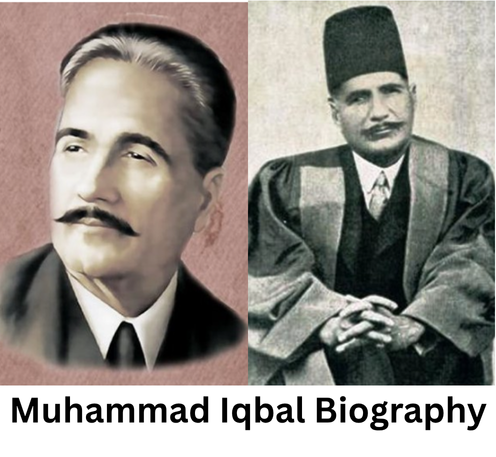Muhammad Iqbal, often revered as the “Spiritual Father of Pakistan,” was not just a poet but a philosopher, politician, and visionary who left an indelible mark on South Asian history. His literary genius and intellectual depth inspired a generation and shaped the idea of a separate homeland for Muslims in the Indian subcontinent. This detailed biography explores the life, works, and legacy of Muhammad Iqbal—from his early years and education to his poetic brilliance and philosophical contributions.
Wiki Data Table
| Field | Details |
|---|---|
| Full Name | Muhammad Iqbal |
| Also Known As | Allama Iqbal |
| Date of Birth | November 9, 1877 |
| Place of Birth | Sialkot, Punjab, British India (now Pakistan) |
| Date of Death | April 21, 1938 |
| Place of Death | Lahore, Punjab, British India |
| Age at Death | 60 years |
| Nationality | British Indian (pre-Partition) |
| Education | Government College Lahore, University of Cambridge, Ludwig Maximilian University of Munich |
| Occupation | Poet, Philosopher, Politician, Barrister |
| Known For | Founding philosophical ideas behind Pakistan, Urdu and Persian poetry |
| Notable Works | Bang-e-Dra, Asrar-e-Khudi, Payam-e-Mashriq |
| Resting Place | Hazuri Bagh, Lahore |
Early Life and Background
Muhammad Iqbal was born on November 9, 1877, in Sialkot, then part of British India. He belonged to a devout Kashmiri Muslim family. His early education was rooted in traditional Islamic studies and Persian literature, which laid the foundation for his future literary pursuits. Iqbal’s natural inclination toward poetry emerged at a young age and was nurtured by his teachers, including the noted Orientalist Sir Thomas Arnold.
Education and Academic Achievements
Iqbal’s academic journey was as profound as his poetry. He graduated with a Bachelor of Arts from Government College, Lahore, where he excelled in philosophy, English literature, and Arabic. He later pursued higher studies in Europe:
- University of Cambridge (UK): Studied philosophy and law.
- Ludwig Maximilian University of Munich (Germany): Completed a PhD in Philosophy. His doctoral thesis, titled “The Development of Metaphysics in Persia,” highlighted his depth in Islamic thought and Western philosophy.
Iqbal returned to India as a highly educated thinker, combining Eastern spirituality with Western intellectualism.
Literary Career and Major Works
Iqbal’s poetry is celebrated in both Urdu and Persian, reflecting a seamless fusion of Islamic ideals, philosophical inquiry, and social commentary. His literary voice was both revolutionary and reformative, aiming to awaken the Muslim community from socio-political slumber.
Most Renowned Works
- Bang-e-Dra (The Call of the Marching Bell): A collection of Urdu poems that trace Iqbal’s literary evolution.
- Asrar-e-Khudi (Secrets of the Self): Written in Persian, this philosophical poem explores the concept of selfhood in Islam.
- Payam-e-Mashriq (Message of the East): A response to Goethe’s West–östlicher Divan, advocating for East-West dialogue.
- Zarb-e-Kalim (The Rod of Moses): Political and social commentary in poetic form.
His poetry often revolved around themes of self-realization, spiritual revival, Islamic solidarity, and opposition to colonial oppression.
Philosophical and Political Vision
Iqbal was not merely a literary figure; he was a political philosopher whose ideas contributed significantly to the creation of Pakistan. Through his speeches and writings, especially his 1930 address at Allahabad, he articulated the idea of a separate nation for Muslims in the Indian subcontinent—a vision later realized by Muhammad Ali Jinnah.
He also emphasized the reconstruction of Islamic thought and was deeply influenced by Sufi philosophy and the teachings of Rumi.
Legacy and Death
Muhammad Iqbal passed away on April 21, 1938, in Lahore. Although he did not live to see the creation of Pakistan in 1947, his intellectual foundation and poetic vision were instrumental in shaping its ideological contours.
Today, he is celebrated annually on Iqbal Day in Pakistan, and his poetry continues to resonate with readers across linguistic and national boundaries.
Frequently Asked Questions (FAQs)
Who was Muhammad Iqbal?
Muhammad Iqbal was a poet, philosopher, and political thinker known for his literary works in Urdu and Persian and for laying the ideological foundation of Pakistan.
What is Muhammad Iqbal famous for?
He is famous for his poetry, philosophical writings, and for conceptualizing the idea of an independent Muslim state, which later became Pakistan.
Where was Muhammad Iqbal born?
He was born in Sialkot, Punjab, which was part of British India and is now in Pakistan.
What were Iqbal’s major contributions to literature?
Iqbal’s major contributions include philosophical poetry such as Asrar-e-Khudi, Bang-e-Dra, and Payam-e-Mashriq, which delve into themes of identity, spirituality, and Muslim unity.
When did Muhammad Iqbal die?
He died on April 21, 1938, in Lahore.
Did Muhammad Iqbal see the creation of Pakistan?
No, he passed away nine years before the establishment of Pakistan in 1947.
Conclusion
Muhammad Iqbal’s legacy is not confined to poetry alone. He was a torchbearer of intellectual freedom, a champion of Muslim identity, and a visionary whose ideas reshaped the political landscape of South Asia. Whether through his soul-stirring verses or philosophical essays, Iqbal continues to inspire generations striving for justice, dignity, and spiritual enlightenment.
